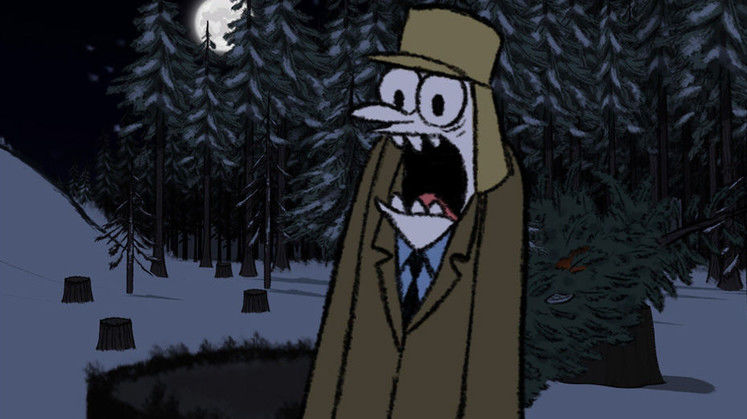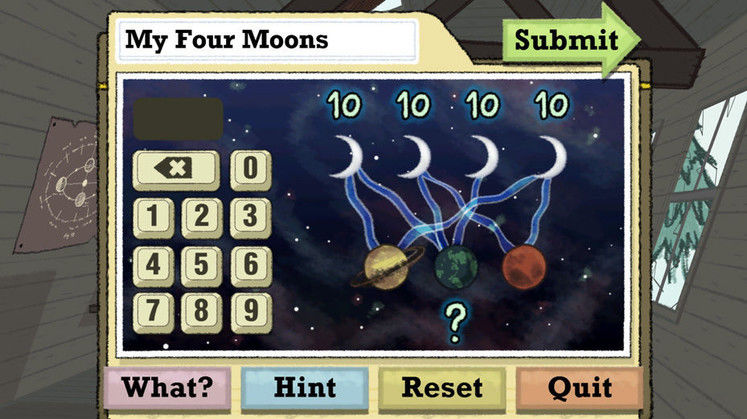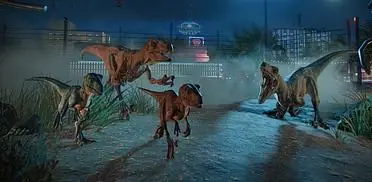Something is rotten in Scoggins, Minnesota: not the reanimated flesh of an undead uprising, but people have been disappearing nevertheless. It's up to Agent Nelson Tethers to uncover the mystery behind the creepy town and its puzzle-obsessed inhabitants. The story continues directly after the first Puzzle Agent, but if you skipped the original it does a great job of filling you in. It plays out like Twin Peaks, or a particularly tame episode of the X-Files. Tethers travels from one location to the next, interviewing the locals on the disappearances and gradually unravelling the nonsensical story. It's amusing, but never engrossing. This is partly because it's just not that riveting a tale, however brilliantly told, but also because the game breaks your sense of immersion every five minutes by shoving a puzzle in your face.
 |
| It’s time to do maths and chew bubble gum, and I’m all outta gum |
When I was young, I'd buy the odd puzzle comic. The majority of these puzzles, I am unashamed to admit, went unsolved. Part of the enjoyment came from flicking through to see what happened next in the story, regardless of whether the previous puzzle had been solved. Maybe that wasn't the way I was meant to be reading those comics, but as with any form of entertainment, we derive our own fun.
Puzzle Agent doesn't work like that, because it can't ever work like that. Each puzzle presents a barrier that must be surmounted for the story to continue. It's not possible to solve some easier tasks and progress with the story before heading back to a more cryptic puzzle, favouring linearity at the expense of choice. Seldom are the riddles truly difficult: to paraphrase Samuel Taylor Coleridge there are puzzles, puzzles, everywhere, but I rarely stopped to think. When you complete a puzzle, you'll be graded on your performance. This is utterly pointless, since it's not like you can replay them for a higher score. You won't want to replay them at all; it would be like rubbing out the pencilled solution to a maze and starting over while the indented memories still showed on the paper.
Puzzles can be lumped into three categories: the immediately solvable and unsatisfying, the tediously solvable and unsatisfying (these involve awkward dragging or heavy-duty clicking to rotate objects), or the ones that stump you completely. These are also unsatisfying. One of the latter group was a horrible number sequence involving nickels, dimes and binary code. A coin value puzzle? Yuck. That's insolvable for an ignorant Irishman like me, or indeed anyone lacking an intimate knowledge of American currency.
 |
| Is that a Rubik’s Cube in your pocket, or are you just pleased to see me? |
I had to resort to hints to get the gist of the task: "Think about the value of the coins," says hint number one. Well, that's not helping. "There are only 10 types of people in the world: those who understand binary, and those who don't." That's a joke, not a hint. You're just mocking me. Final clue: "Binary code is uses (sic) ones and zeros. If the first box is 001, the second 020, and the third 011, how would 100 be represented?" Uh...
So, it was random coin clicking time! I clicked the dollar and succeeded, but disappointingly it wasn't due to my tremendous puzzle-solving skills. "That wasn't so bad," said Agent Tethers. I begged to differ. The problem comes from the framing of the puzzles: if you haven't got a clue what your objective is (does that count as a pun?) it makes it difficult to avoid using the hint system just to find out what you're doing. You can collect pieces of chewing gum around town, which are cashed in for clues, but I had over forty pieces by the end of my brief adventure. Maybe Duke Nukem would like to borrow some, since he's always out.
Most of the challenges are uninspired number sequences, picture rearrangements and maze tasks that would be dull in an intelligence test; but to package them together in a computer game and charge money to solve them feels almost cruel. I can't think of a single puzzle that I really enjoyed solving, found clever or novel. It's the opposite of something like Monkey Island, where every solved puzzle felt like a small victory and had a hilarious payoff. Puzzle Agent 2 feels rushed, with more attention paid to style than substance. Unfortunately, the style isn't nearly stylish enough to carry it through.
 |
| If this screenshot doesn’t excite you, do not buy this game |
Traditional number puzzles, mazes and sequences are already games. They don't need to be presented electronically, and I'm not sure they really work that way. When we struggle with a puzzle in a book, we can move onto another: when we stumble in Puzzle Agent, we're intellectually marooned until we come with an answer, usually through trial and error or glancing at Youtube in shame and defeat. I wanted a more non-linear adventure, where the puzzles emerged organically from the story. I wanted more plot and less puzzle solving, to give Graham Annable’s great artwork and the excellent characters some room to breathe. I wanted to be surprised, and dare I say it, puzzled. I wanted Grim Fandango.
It’s full of little jokes that raise a chuckle and keep the enthusiasm from waning… almost.
PUZZLE AGENT 2 VERDICT
If you were to summarise it in a puzzle, Puzzle Agent 2 would be a paint-by-numbers picture: formulaic, messy, and unable to hold the attention of all but the most easily perplexed.
TOP GAME MOMENT
It’s full of little jokes that raise a chuckle and keep the enthusiasm from waning… almost.




